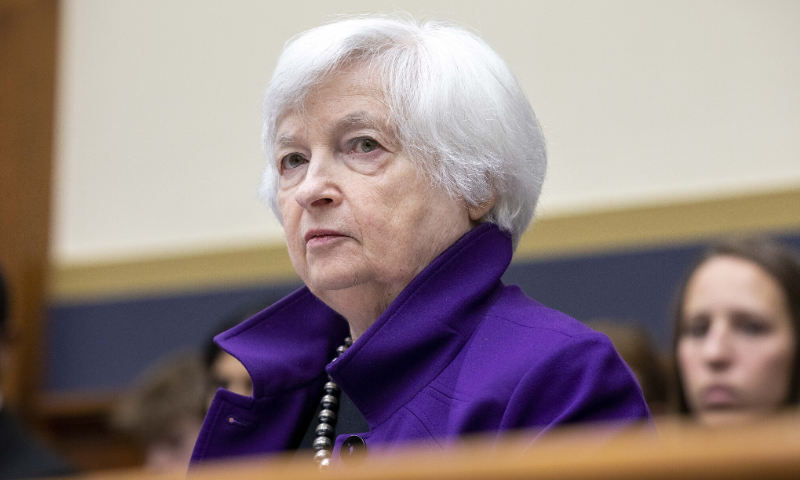
US Treasury Secretary Janet Yellen Photo: VCG
Us Treasury Secretary Janet Yellen mentioned two words, “constructive” and “responsible,” ahead of her visit to China. Will she deliver it?
On Thursday, Yellen arrived in Guangzhou, South China's Guangdong Province to begin her visit to China from April 4 to 9. This marks Yellen's second visit to China within nine months since her last visit in July last year.
A notable and progressive aspect of Yellen's visit this time is the improved stability in the economic and trade relations between China and the US. The establishment of the China-US Economic Working Group and Financial Working Group in September has seen successful dialogues over the past six months. Additionally, the November meeting between the leaders of the two nations provided strategic consensus. Recent visits by American business leaders to China also demonstrate a strong desire and demand for expediting the normalization of China-US economic and trade relations.
Overall, Yellen's visit to China sends a positive signal regarding the economic and trade relations between the two countries. First, both sides are willing to engage in sustained dialogue and interaction to openly and deeply explore the issues existing in the bilateral relationship, particularly when it comes to economic and trade sectors. Second, it showcases to the world that China and the US, as the two leading locomotives of the world economy, hope to instill confidence in the world economy by managing and resolving differences, injecting positive energy and stability into global economic growth.
However, it must also be noted that Yellen's visit carries contentious and negative elements. The US Department of the Treasury stated that Yellen would "advocate for American workers and businesses to ensure they are treated fairly, including pressing Chinese counterparts on unfair trade practices and underscoring the global economic consequences of Chinese industrial overcapacity.”
"It is quite clear to all whether it is ‘excess production capacity’ that the US is truly concerned about," said Foreign Ministry spokesperson Wang Wenbin on Wednesday. In recent years, China has vigorously developed green industries such as electric vehicles, lithium batteries, and photovoltaic products. This benefits from long-term investments and research in green technology, which also contributes to global green development.
"The US claim itself is problematic; this is actually a result of market choices," Zhang Tengjun, deputy director of the Department for Asia-Pacific Studies at the China Institute of International Studies, told the Global Times. "Other countries recognize that importing related products from China is beneficial to their own economies and livelihoods. This is a mutually beneficial process."
Last week, asked if Yellen would raise the threat of “new trade barriers” during her visit to China regarding the so-called "overcapacity," Yellen said she did not want to "get into retaliation," adding that, "we want to see what we can do that's ‘constructive.’"
Yellen's statements on bilateral relations have consistently been moderate. However, During Yellen's visit to China , she would by no means adopt an arrogant attitude, starting with a show of force by accusing China of "overcapacity," and resorting to non-market operations to rationalize restricting China's development, Li Haidong, a professor at the China Foreign Affairs University, told the Global Times.
Truly "constructive" behavior should be reciprocal and equitable. What the US should do is to stop implementing restrictive measures and continuously hyping up the so-called "overcapacity," but to demonstrate sincerity, increase investment in green industries while engaging in fair and reasonable competition with Chinese counterparts in the industry.
On Thursday, Yellen stated on social media that as the world’s two largest economies, it is critical that China and the US maintain clear channels of communication – particularly when two sides disagree. “The American people expect us to responsibly manage this relationship, and the world expects that we work together where we can.”
However, the key issue lies in the fact that Washington's actions in recent years, saying one thing and doing another, have severely undermined confidence in China-US relations, to the extent that it is difficult to believe what the US says. If the US truly wants to treat China-US relations "responsibly," the first thing to do is to implement equality and reciprocity in practice. Only then will China and the US move toward each other.
Yellen stated on Wednesday that it is important for the US and China not to decouple. However, whether it is the US TikTok ban, restrictions on China's access to high tech, or putting up barriers against China's exports to the US, what people see is only a severe approach from the US.
The economic and trade relations between China and the US are interdependent and indispensable, serving as a cornerstone for overall stability in China-US relations. The positive approach Yellen could bring should be recognized, and China and the US can find a more effective way to resolve economic and trade disputes only through continuous communication.




